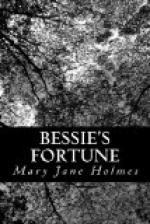“I promise that, too. I will never play again for money with anyone, but for my reward you must let me visit you at Stoneleigh sometime.”
“Oh, yes, you may,” she answered, “but I warn you it is a poor place to come to, with only old Anthony and Dorothy to do anything. I have to work, and you may have to work, too, and do other things than mending father’s coat.”
She spoke playfully, and Jack declared his readiness to sift cinders, or scour knives, or do anything, if she would let him come. Just then Neil arrived, not altogether pleased to find Jack there before him, standing close to Bessie, who was looking very happy. The two young men went with her to the station, where they vied with each other in showing her attention. Jack held her traveling-bag, and her parasol and fan, and band-box containing the white chip hat, and Neil held her shawl, and umbrella, and paper bag of biscuits and seed cakes which Mrs. Buncher had given her to eat upon the road, and when at last she was gone, and they walked out of the station into the noisy street, each felt that the brightness of the summer day had changed, and that something inexpressibly sweet had been taken from them.
CHAPTER IX.
CHRISTMAS AT STONELEIGH.
Two years and a half after that visit to London, Bessie McPherson, now a young lady of nearly eighteen, stood by the western window of the old house at Stoneleigh reading a letter from Neil. He had been at Stoneleigh several times since that summer in London, and these visits, with his letters always so affectionate and bright, were the only breaks in Bessie’s monotonous life. Once Jack had been there for a few days, or rather to the “George,” where he slept and took his meals, spending the rest of the time with Bessie, who interested him more and more, and from whom he at last fled as from a positive danger. With his limited income and his habits, he could not hope to marry, even if Bessie would have joined her young life with his matured one, which he doubted, and, with a great pang of regret he left her in the old Stoneleigh garden and did not dare look back at her, sitting there with the troubled look on her face, because he was leaving, lest he should turn back and, taking her in his arms, say the words he must not say.
And so he went his way to busy London, and heard from Blanche that the white-haired old earl in the north of England was dead, and the puny Dick master in his place.
“Only two between you and a fortune,” seemed whispered in his ear, and with it came a thought of Bessie sitting under the old yew tree in the summer sunshine and looking after him.
“Murderer!” he said to himself again, “do you wish Dick dead and Hal, too, the finest fellow that ever lived, for the sake of a young girl whose mind is full of a prig like Neil McPherson?”
And so he put all thoughts of Bessie aside, and wore mourning for his great-uncle, and wrote a letter to the new heir, Sir Dick, and sent his love to Flossie, and went no more to Stoneleigh. But Neil was coming again, and his letter to Bessie was as follows:




